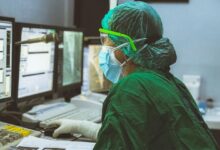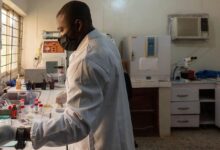Antimicrobial resistance crisis ‘happening now,’ WHO’s Tedros stresses at Jeddah summit
 The top UN health official gave a sobering reality check as the Fourth Global High-Level Ministerial Meeting on Antimicrobial Resistance began Friday in Jeddah: “AMR doesn’t just threaten to make the medicines on which we depend less effective; it’s happening now.”
The top UN health official gave a sobering reality check as the Fourth Global High-Level Ministerial Meeting on Antimicrobial Resistance began Friday in Jeddah: “AMR doesn’t just threaten to make the medicines on which we depend less effective; it’s happening now.”
In remarks to the Conference, Tedros Adhanom Ghebreyesus, the Director-General of the UN World Health Organization (WHO), said that what is being discussed is not merely the risk of people dying because of superbug infections, “they are dying now – 1.3 million people every year.”
Arriving in the Saudi Arabian seaside city of Jeddah after participating in the latest UN climate conference, COP29, now underway in Baku, Azerbaijan, Dr. Tedros said antimicrobial resistance (AMR) action “is equally as urgent as climate action.”
Tweet URL
He said that the Political Declaration on AMR agreed this past September by the UN General Assembly sets clear targets and the task now is to translate it into concrete action.
The WHO chief highlighted three priorities for implementing that Declaration – particularly for low- and middle-income countries:
“The irony of AMR is that it’s driven by the inappropriate use of antimicrobials, and yet a large number of people also die because they can’t access these medicines at all,” he said.
Emphasizing that AMR “is right here and right now, but so are the solutions” Dr. Tedros called on stakeholders to seize the opportunity presented at the Jeddah Conference “to accelerate action on AMR, commit to stronger collaboration, and protect the medicines that protect us.”
Antimicrobial resistance occurs when bacteria, viruses, fungi, and parasites cease to react to antimicrobial drugs. Because drug resistance renders antibiotics and other antimicrobial treatments ineffective and makes treating infections more difficult or impossible this can lead to superbugs that can’t be stopped by medicines that are the first choice for treating diseases these germs cause, increasing the risk of disease transmission, severe illness, disability, and death.

UN News/Nabil Midani
Fahad Abdulrahman Al Jalajel, Minister of Health of Saudi Arabia, addresses the opening of the AMR Conference in Jeddah.
‘Precious gift’ of modern medicine
Saudi Minister of Health Fahad Al-Jalajel warned participants at the conference that AMR “deeply affects all aspects of life” and poses a direct threat to public health, economic stability, and global security.
This challenge knows no borders and affects all ages and groups”, he said.
Mr. Al-Jalajel said all states participating in the ministerial meeting are “well aware of the magnitude of this challenge and the urgent need to take new measures to address AMR”.
The ‘Jeddah Declaration’ currently being negotiated as the Conference’s outcome document, contains important Saudi initiatives, such as the formation of a global scientific committee to support antimicrobial resistance, the establishment of a ‘biotechnology bridge’ to support research and development, in addition to a proposed knowledge centre that aims to raise community awareness on AMR.
Mr. Al-Jalajel stressed that at this stage, the draft declaration serves the purpose of the Conference’s theme, ‘from declaration to implementation’, and fulfills the agreements reached in the General Assembly’s political declaration.
“Without effective antibiotics, we risk losing the gains of modern medicine. We owe it to future generations to preserve this precious gift,” he said.

© WHO/Sarah Pabst
A scientist in Venezuela investigates antimicrobial resistance (AMR), considered one of the top 10 global public health threats, which occurs when viruses change over time and no longer respond to medicines.
AMR transcends health
Dr. Hanan Al Balkhy, the WHO Regional Director for the Eastern Mediterranean, said AMR is not an issue that is covered solely by the third Sustainable Development Goal (SDG 3) related to health, rather, the AMR agenda sits in at least 11 of the 17 global goals – from food production to equity.
This is why multi-sectorial conversations like those taking place in Jeddah are so important, she said, “to bring to the attention of stakeholders working on the other SDGs that, by the way, AMR should not be forgotten in your agendas.”
Speaking to UN News, Dr. Al Balkhy said that as a Saudi citizen, she was very proud that the Jeddah Declaration and the commitments set to be adopted Saturday at the close of the conference “are coming out from my hometown, where I grew up and where I did my studies.”
The Jeddah Conference, she said, is about partnerships, sharing experiences, and understanding better ways of communication, adding that bending the curve, even a little, on AMR “would be a great achievement”.

UN News/Nabil Midani
Dr. Hanan Balkhy, WHO Regional Director for the Eastern Mediterranean, during an interview with UN News at the 4th Ministerial Conference on Antimicrobial Resistance (AMR).
Challenging even in times of peace
Dr. Al Balkhy said the push to tackle AMR is a “very heavy agenda in peace, and it’s even heavier in conflicts” as people lack the proper hygiene and health tools to keep themselves safe and avoid creating a breeding ground for antimicrobial resistance.
As conflicts are rampant in the area she serves, the Regional Director said WHO said she would remain “a strong voice on abiding by international law in not attacking health care facilities, which is considered a main investment for access to health, and not to target health workers who are critical in providing proper health care.”
She said WHO is trying to be “as innovative as possible” to protect people in conflict zones from the spread of AMR, including by providing safe drinking water and mitigating open defecation challenges.
Bacteria are here to stay
Ms. Al Balkhy has dedicated a large part of her studies and career to combating AMR and so understands the difficulty in tackling this global health challenge.
She said: “Bacteria have one aim in life. They’re going to survive. They survived before us and unfortunately, they might be surviving millions of years after us. So, the smart thing for us to do is at least to catch up with the evolution of these microbes and to make sure that we’re not harming ourselves by them with the machinery and the equipment to become resistant to these very critical therapeutics.”

UN News/Nabil Midani
Mr. Thanawat Tiesin , FAO Director of the Animal Production and Health Division, and Chief Veterinarian speaks to UN News at the Fourth Global High-Level Ministerial Conference on AMR.
She told UN News that she hoped the international community could reach a point where it is no longer consumed by war and could focus on “development, prosperity, advanced medical care, [so that] we’re not worried that these bacteria will set health care advances back decades.”
‘Real change’ on the ground
Another conference attendee, Thanawat Tiensin, Assistant Director-General of the UN Food and Agriculture Organization (FAO), said his organization would like to ensure that countries, producers, farmers, the private sector, academia, and other stakeholders take their own initiatives to reduce the need for antimicrobials in farming.
Through collective action, he stressed, “more can be done to ensure better health outcomes for people and animals”.
Mr. Tiensin, who also serves as the organization’s Chief Veterinarian, told UN News about several FAO initiatives that serve this purpose, including RENOFARM (Reduce the Need for Antimicrobials on Farms).
Others he mentioned included InFarm (International FAO Antimicrobial Resistance Monitoring system), and the Global Farmer Field School Platform.
All these initiatives serve as tools to build sustainable agrifood systems, and to transfer knowledge and best practices directly to the people who can make real change on the ground.
With approximately 70 per cent of antibiotics being used in livestock production, aquaculture and plant production, Mr. Tiensin said: “If we want to control the antimicrobial resistance problem, we need to control it at the root. We need to change the way that we are producing food, and by doing so, we can make sure that we can feed 8 billion people today and 10 billion people by 2050.”
Soundcloud



